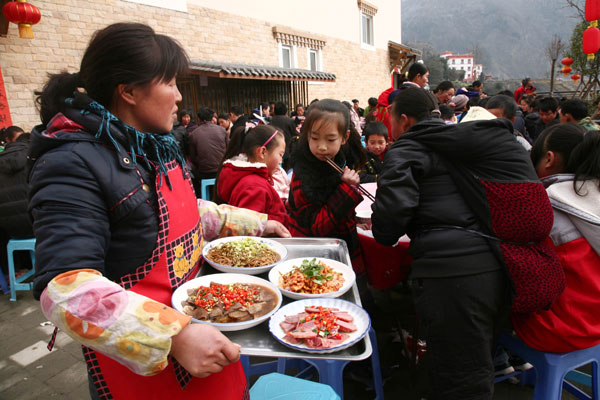Society
County rebuilds after quake
By Li Li (China Daily)
Updated: 2011-02-01 08:03
 |
Large Medium Small |
 |
|
Zhangjiaping village in Yingxiu town, Sichuan province, hosts a free meal on Saturday for several hundred villagers who move back before the Spring Festival. [Photo/China News Service] |
BEICHUAN, Sichuan - Three years after a deadly earthquake struck Sichuan province, once-devastated quake zones are regaining their vitality and residents are finding ways to continue their lives.
The catastrophic quake that occurred on May 12, 2008 destroyed the entire downtown area of Beichuan county. Rather than clear the ruins away, officials decided to reopen the site as a park. Chen Shimin, a 50-year-old Beichuan resident who used to sell pancakes with her husband outside the gate of Beichuan High School, recently became a staff member there.
But that job opportunity only arose after a long period of unemployment. Saddened by the death of her husband, who was killed during the earthquake, Chen didn't look for work for two years.
"I want to stay where he is," said Chen, who now cleans the park's public toilets.
Chen's family received 5,000 yuan ($758) in compensation for the death of her husband. Like most Beichuan residents who were harmed by the quake, she lived on rice, oil and a 300-yuan monthly transitional subsidy provided by the government. She received the assistance for half a year.
"I need the job," said Chen, who is earning a monthly salary of 1,000 yuan. "It's not much, but I'm standing on my own feet again."
About 23 kilometers away from the ruins of the old county lies the new Beichuan county, built after the earthquake.
Deng Hui works as a street cleaner there, making a monthly salary of 750 yuan.
"My tofu shop was destroyed during the earthquake, and my husband was inside," said the 46-year-old woman, who only recently moved to the new county.
"When I have enough money, I plan to rent a storefront here and restore my tofu business."
Ma Baojun runs a rural inn in Yuzixi village of Yingxiu town and organizes special "quake tours" for tourists. The town was the most heavily hit place in Wenchuan county, which was the epicenter of the Sichuan earthquake and is some 130 km away from Beichuan county.
To date, Yingxiu town still contains huge rocks that fell from surrounding hills during the disaster, along with the hulks of destroyed buildings. Both stand as reminders of the recent mayhem and have become tourist attractions.
Ma has taken visitors to those places and told them of his earthquake experiences countless times.
But, "the business is getting harder now," Ma said. "The roads are repaired and people choose to drive here by themselves."
There are many villagers who, like Ma, transport tourists among "quake attractions" in Yingxiu.
Xuankou High School, for instance, became the most visited place in Yingxiu town after President Hu Jintao and other top Chinese leaders attended memorial ceremonies there in 2009 for the first anniversary of the devastating earthquake.
According to nearby residents, many small vans come to park in the square in front of the school during weekends, unloading and picking up tourists.
"We encourage villagers to make a living by taking the advantage of views left by the earthquake," said Yang Xi, who works in the reconstruction headquarters of the town.
"As long as they are not in the way of our reconstruction work, we won't interfere."
In cooperation with Yimiyangguang Group, a tourist enterprise in Lijiang of Yunnan province, the Yingxiu government is planning to make big moves into the sightseeing industry.
"We have just signed a 40-year contract with them," said Peng Jianjun, deputy chief of Yingxiu town. "Our next goal is to build Yingxiu into a tourist resort that features earthquake tours and patriotism education."
Hotels, restaurants and shopping malls will be constructed in accordance with the plans, creating jobs for salespeople, cooks, drivers and security guards.
At a job fair arranged in Yingxiu town by the tourist enterprise, those in attendance learned of vacancies for 1,268 positions.
At the same time, the quake zones are also attracting educated young people from outside.
Zhang Yan has been working as a psychiatrist in the psychological rehabilitation center of the Wenchuan County Hospital since August 2009.
The 25-year-old graduate from Chengdu Medical College, who majored in applied psychology, declined to take various jobs in big cities and instead went to the disaster stricken place.
"Lots of people here have suffered from post traumatic stress disorder after the earthquake, and they need professional help," Zhang said. "So here I am."
| 分享按鈕 |



